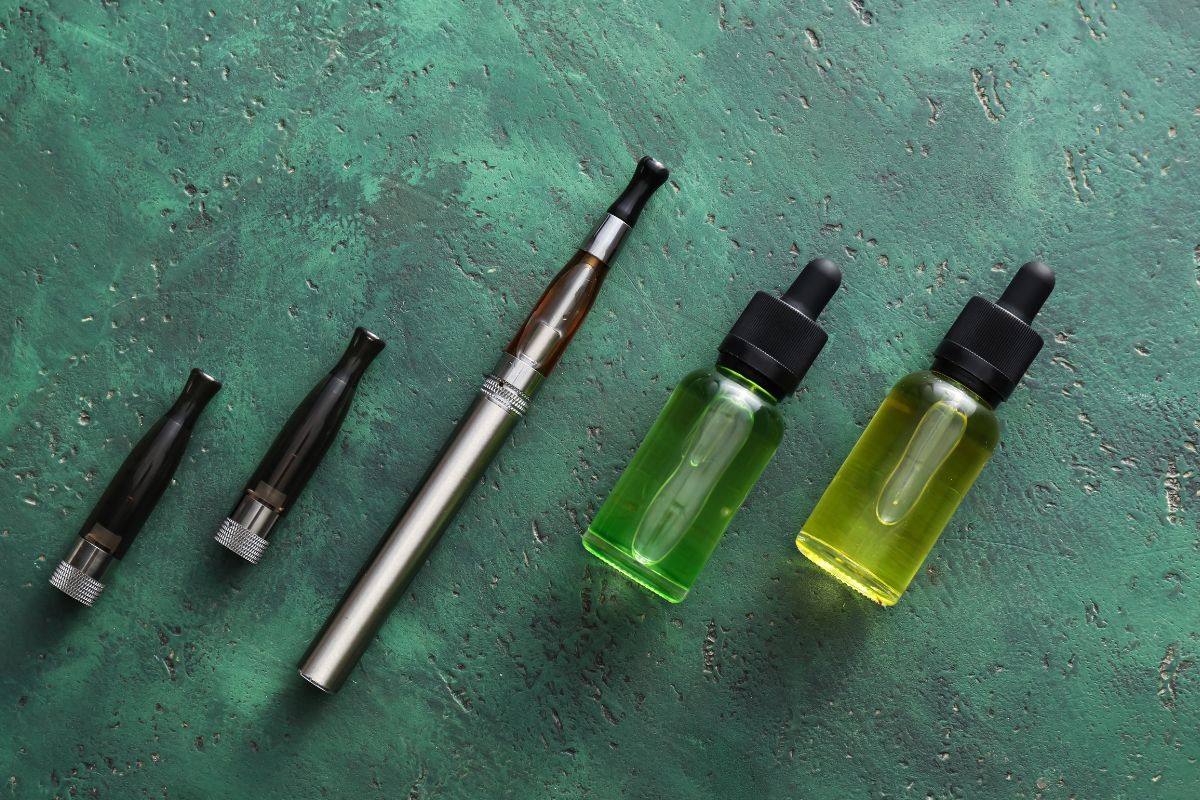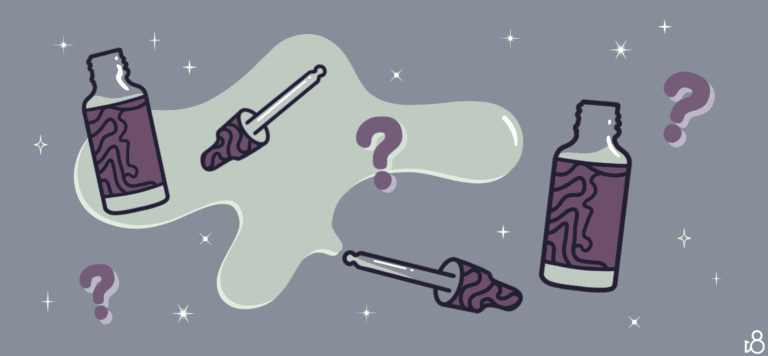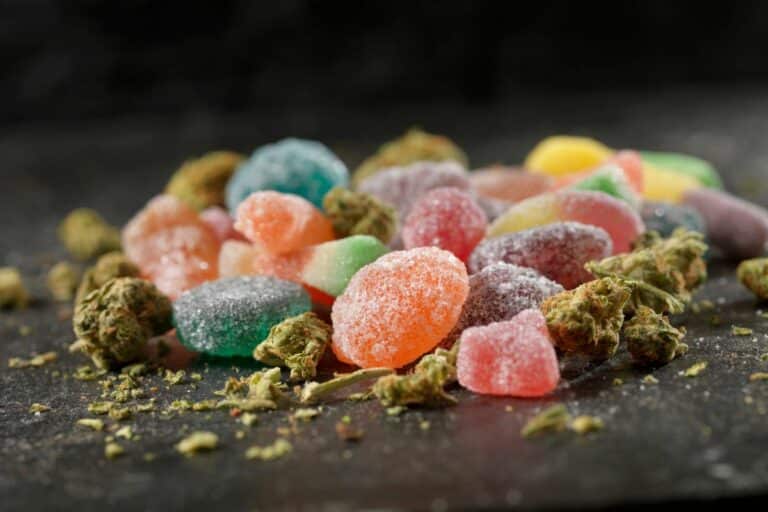Can You Microdose Delta 8? Exploring the Subtle Approach to Consumption
Microdosing is the newest craze, letting you reap incredible perks from different stuff without diving deep. Imagine Delta 8 THC as Delta 9 THC’s laid-back relative – it could be your secret weapon to melt stress away, ignite your creativity, or kick pains to the curb all while keeping your routine intact.
Table of contents
The concept of microdosing Delta 8 THC involves consuming small, sub-perceptual amounts of the substance. This practice may allow you to experience subtle physiological changes without a significant high, which can be appealing if you seek to maintain clarity and productivity. Users of Delta-8 THC report using various forms of the compound, like vape pens and gummies, to achieve the desired microdose.
Before considering this practice, it’s important to understand the legal status of Delta 8 THC which varies by location, as well as potential safety concerns. Consulting a healthcare professional and starting with the lowest possible dose is advisable to ensure responsible use aligned with your wellbeing goals. Additionally, familiarity with how Delta 8 THC interacts with the body’s endocannabinoid system could guide your microdosing decisions.
Understanding Microdosing
Microdosing is a technique primarily you might associate with psychedelic substances, but it can be applied to a range of compounds, including cannabinoids like delta-8 THC. By fine-tuning the dose, you can seek to achieve the therapeutic benefits without full-blown psychoactive effects.
What Is Microdosing?
Microdosing involves taking sub-perceptual doses of a substance, which means the dose is too low to cause significant alterations in mood, perception, or behavior. Typically, it’s about 1/10th to 1/20th of a recreational dose.
- Psychoactive Effects: Minimized
- Intent: Therapeutic or cognitive enhancement without impairment
Microdosage Vs. Full Dose
Comparing microdosing to a full dose is central in understanding its purpose and potential benefits.
- Microdose: Non-intoxicating effects; often indiscernible
- Full Dose: Full spectrum of effects; including psychoactivity
The idea behind microdosing is to maintain your daily functionality while possibly gaining subtle improvements in areas like focus, stress levels, or creative thinking.
Cannabinoids and the Endocannabinoid System
Cannabinoids such as THC and CBD interact with your endocannabinoid system (ECS), which plays a crucial role in regulating various physiological processes. Microdosing cannabinoids, particularly those like delta-8 THC, which have a lower psychotropic potency than delta-9 THC, could potentially offer therapeutic effects with reduced risk of the psychoactive experiences associated with higher cannabinoid doses.
- Delta-8 THC: Known for a clearer high and less anxiety than delta-9 THC
- Delta-9 THC: The most abundant form of THC in cannabis, associated with strong psychoactive effects
- CBD: Non-psychoactive, often used for various health purposes without altering the state of mind
Remember, the goal of microdosing is to harness the compound’s effects in a way that you can integrate it into your daily life without disruption.
Delta 8 THC Specifics

When you explore the world of cannabinoids, Delta 8 THC emerges as a compound with distinct characteristics and effects that differ from its more famous cousin Delta 9 THC.
Delta 8 THC: An Overview
Delta 8 THC is a psychoactive substance found in the cannabis plant, but it generally exists in much lower concentrations than Delta 9 THC. Its psychoactive potency is considered to be less intense, which has sparked interest in its potential for producing milder, more manageable effects. Extractors typically derive Delta 8 THC from hemp, utilizing specific processes to isolate and concentrate the compound.
Comparing Delta 8 THC to Delta 9 THC
Potency and Effects:
- Delta 9 THC: Known for its strong psychoactive effects, it is the dominant form of THC found in cannabis plants.
- Delta 8 THC: Often described as “diet weed,” it provides a less potent psychoactive experience, which might be preferred by individuals looking for a more subdued effect.
Legality and Availability:
The legal status of Delta 8 THC can be somewhat murky, with variations from one jurisdiction to another, often because of its association with hemp, which is federally legal in many regions, unlike cannabis-derived products. This nuance has led to wider availability of Delta 8 THC products in some areas.
Remember, when consuming any THC product, it’s important you understand the specific laws of your area as well as the potential effects on your body.
Benefits of Microdosing Delta 8 THC

Microdosing Delta 8 THC is gaining traction for its nuanced approach that may offer you various therapeutic and health benefits without the intense psychoactive experience typically associated with cannabis.
Therapeutic Potential
When you microdose, Delta 8 THC could potentially ameliorate symptoms of anxiety, depression, and stress without overwhelming your senses. Research into cannabinoids suggests that a microdose of THC could be particularly beneficial for maintaining mental health balance, potentially providing therapy benefits that do not heavily impair your cognitive function.
Cognitive and Emotional Influence
The art of microdosing could play a role in subtly enhancing your creativity and cognitive function. Focused on neurocognitive functions, small doses of Delta 8 THC may elevate your mood and productivity, enabling you to tackle challenges with increased focus. It’s suggested that low-dose THC can increase neural complexity, which is associated with improved cognitive and emotional processing.
Physical Health Impacts
Beyond mental well-being, microdosing Delta 8 THC is being explored for its effects on physical health, like pain management and sleep issues. The health benefits of THC from a microdosing perspective might allow you to gain the anti-inflammatory and analgesic effects, bettering your energy levels through improved sleep and reduced discomfort, all while keeping you clear-headed.
Microdosing Delta 8 THC Safely

When exploring the world of Delta 8 THC microdosing, it’s essential to use safe practices. Here are strategies to ensure your dosing is effective, that you avoid overconsumption, and that you consider health implications.
Effective Dosing Strategies
Determining the right dose for microdosing Delta 8 THC can vary depending on personal factors like your weight and tolerance levels. Start with a low milligram amount, such as 1-5 mg, which can usually be measured accurately with a tincture. For products like gummies or edibles, ensure they have clear labeling to guide your dosing. It’s critical to gradually increase your dose, allowing time to monitor effects and establish your optimal microdosage.
Avoiding Overconsumption
To prevent overconsumption, pay close attention to the dosage of your chosen Delta 8 product. Vape dosing can be less precise than tinctures or edibles, making careful moderation essential. Record your doses and the timings to track your consumption accurately. If you experience undesirable side effects, such as excessive psychoactive effects, reduce your dose. Always allow a full cycle of effects, which could last several hours, before taking another microdose to avoid accidental overdose.
Health Considerations
Though microdosing is about taking small amounts, there are health considerations to keep in mind. Delta 8 THC may alter liver enzyme levels and could lead to a positive drug test result. Be aware of the potential long-term effects on your liver and regularly monitor your health with your physician. While microdosing is seen as a low-risk activity, maintaining an awareness of how your body reacts is key in preventing any adverse effects.
Administration of Delta 8 THC
In exploring Delta 8 THC administration, it’s essential to understand the diverse consumption methods available and the importance of selecting a product that aligns with your preferences and requirements.
Consumption Methods
Vaping: Utilizing vape pens for Delta 8 THC allows for precise control over dosage, with each puff offering a consistent amount of product. You can choose from a variety of vape pens and vaping devices available at specialty stores or online retailers. Vaping delivers Delta 8 THC through inhalation, which typically results in a quicker onset of effects compared to other methods.
- Tinctures: Tinctures are administered sublingually (under the tongue) and offer a discrete way to consume Delta 8 THC. You can find tinctures with droppers that enable fine-tuned precision in dosing.
- Capsules: Capsules provide a pre-measured dose of Delta 8 THC and are convenient for those who prefer not to measure their own doses. This option also offers the benefit of a consistent dosing schedule.
- Flower: Delta 8 THC flower can be smoked or used in a dry herb vaporizer. Dosing can be less precise with flower, so if choosing this method, paying attention to the number of puffs and the effects they produce can help you find the right dose.
Finding the Right Product
When looking for Delta 8 products, consider reputable stores that provide lab-tested options. Pay attention to product labeling for information on THC content, which can guide your dosing.
- Journals: Keeping a journal to note your experiences with various products, dosages, and effects can help you determine the best fit for your needs.
- Precision: Look for products that offer clear dosing information for accurate administration, especially if you’re new to Delta 8 THC or considering microdosing.
By taking the time to understand the different methods of administration and the types of Delta 8 THC products available, you can make informed choices about your consumption and establish a dosing schedule that works for you.
Practical Considerations for Microdosing
Before you embark on microdosing Delta 8, understanding the fundamentals of microdosing, from establishing a routine that aligns with your wellness goals to choosing the right product, is essential to achieve the desired balance between cognitive enhancement and maintained functionality.
Daily Routines with Delta 8
Creating a daily microdosing routine with Delta 8 THC involves considering your personal situation, including your professional responsibilities and social interactions. Microdosing is about maintaining sub-perceptual doses that do not induce a high, but may offer potential benefits like improved focus or reduced social anxiety.
- Morning: Start with a threshold dose to assess tolerance.
- Midday: If your morning dose is well-tolerated and you believe your cognitive performance can be further optimized, you might consider a second microdose, depending on your body’s response.
- Evening: Reflect on the day’s experience. Note any changes in your chronic pain levels or anxiety to adjust the next day’s dose.
Product Selection and Usage
Product selection is a key factor in successful microdosing protocols. Look for products specifically designed for microdosing with clear dosage and potency information to avoid imprecise dosing.
- Potency: Choose a product with consistent and verifiable potency to ensure you are receiving a non-psychoactive dose.
- Dosage: Start with the lowest possible dose and increase gradually to find your ideal sub-perceptual dose.
- Form: Delta 8 is available in various forms, such as tinctures or edibles. Select a form that best fits into your wellness routine.
Remember, microdosing’s role in your life can vary greatly depending on factors like sex and underlying health conditions. It’s important to approach microdosing with a goal-oriented mindset and adapt your practice to your own unique needs and daily demands.
Legal and Safety Issues

When considering the use of Delta 8 THC, it’s crucial to understand the legal landscape and how to use the substance safely. Delta 8 is a nuanced compound, requiring a clear understanding of its regulation and potential risks, particularly in relation to its psychoactive effects.
Regulation and Compliance
Delta 8 THC is a cannabinoid found in hemp and is often marketed as a legal alternative to Delta 9 THC due to the 2018 Farm Bill, which legalized hemp-derived cannabinoids. However, legal status can vary significantly between jurisdictions. While Delta 8 THC might be federally legal, states have the discretion to control its distribution and use. It’s important to check local laws before purchasing or using Delta 8 products.
You should also be aware that product labels can sometimes be misleading. For accurate dosage and content information, consider the calculation of mg of Delta 8 THC per ml of oil. For example, a full-spectrum CBD oil with 5% Delta 8 THC concentration would have 50mg of Delta 8 per 1ml of oil. Always look for products with clear, lab-verified labeling of their content.
Responsible Use and Precautions
Delta 8 THC carries psychoactive effects, and these should not be underestimated. Just like with any THC product, Delta 8 use requires caution, particularly when it comes to activities like driving or operating heavy machinery. Impaired judgment or coordination could lead to serious accidents.
It is essential for you to microdose responsibly, starting with a minimal amount, to assess individual tolerance. Since Delta 8 THC is potent, a microdose can be as minute as a single milliliter, depending on the concentration of your product. Always adhere to recommended dosages and start with the lowest possible dose to mitigate any unwanted effects.
Frequently Asked Questions
In this section, you’ll find detailed responses to common queries about the intricacies of microdosing Delta 8 THC, including its benefits, risks, and legal considerations, as well as guidance on dosing and methods to handle an overdose.
What are the benefits and risks of microdosing Delta 8 THC?
Microdosing Delta 8 THC may offer benefits such as anxiety relief and mood enhancement. However, the practice also poses risks, including potential legal issues and health effects due to the unregulated nature of the product. For more insights, read about the social context of motivations and risks among users of Delta 8 THC.
How does Delta 8 THC compare to Delta 9 in terms of effects and legality?
Delta 8 THC is often reported to have milder psychoactive effects than Delta 9 THC. Legally, Delta 8 falls into a gray area and is not federally regulated, raising concerns about its legality, which can vary by state. To understand better, consider the differences between Delta 8 and Delta 9.
What is the recommended dosage for a first-time user of Delta 8 gummies?
For first-time users, starting with a low dose, such as 5-10 mg of Delta 8 in gummy form, is suggested to gauge individual sensitivity. Dosages can be adjusted based on personal tolerance and intended effects.
How can one safely determine an appropriate microdose of Delta 8 for personal use?
To determine a safe microdose, start with the smallest possible amount and gradually increase the dosage while monitoring your body’s response. It’s essential to understand that microdosing effects can vary based on individual biology.
What should you do if you accidentally consume too much Delta 8?
In the event of overconsumption, it’s important to stay calm and find a safe, comfortable space. Hydration and rest can help mitigate unwanted effects. Seek medical attention if symptoms are severe or concerning.
What are the most effective methods to enhance the absorption of Delta 8 products?
To enhance absorption of Delta 8, taking products with fatty foods may improve bioavailability. Sublingual administration (under the tongue) is another effective method for quick absorption into the bloodstream.








